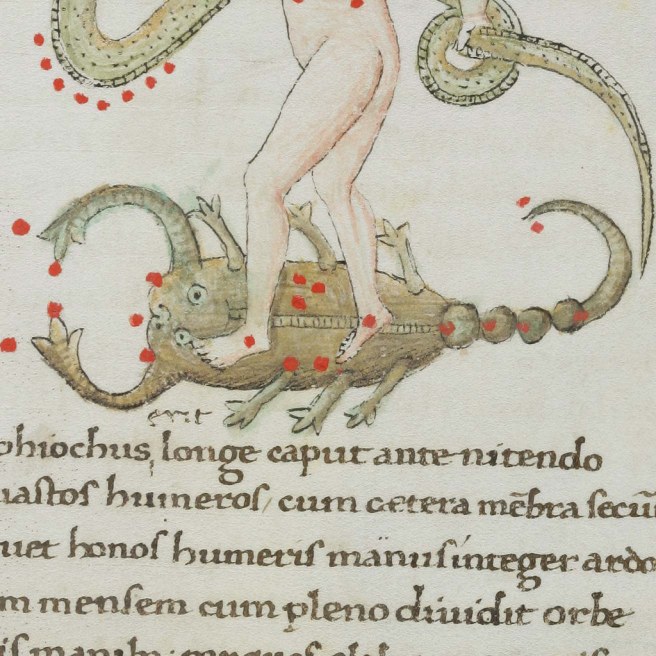Apollonios the Paradoxographer is credited with a text of 51 anecdotes usually dated to the 3rd or 2nd century BCE. Some of these translations are pretty rough, so suggestions and corrections are welcome.
40 “Aristoxenos the scholar writes in his Life of Telestes (a very man he happened to meet in Italy) that he was undergoing sufferings at the time. Of these there was one as well which was the strangest event and it transpired concerning the women.
For these women were ecstatic to the point that once they were sitting and dining because they were heeding someone who was bidding them, but then they leapt up and became unconquerable and ran out of the city.
To the Locrians and the Rhegians seeking a prophecy about the resolution of this sickness the god said that they had to sing the spring paeans for twelve days. For this reason there are many Paean-writers in Italy.”
40 ᾿Αριστόξενος ὁ μουσικὸς ἐν τῷ Τελέστου βίῳ φησίν, ᾧπερ ἐν ᾿Ιταλίᾳ συνεκύρησεν, ὑπὸ τὸν αὐτὸν καιρὸν γίγνεσθαι πάθη, ὧν ἓν εἶναι καὶ τὸ περὶ τὰς γυναῖκας γενόμενον ἄτοπον· ἐκστάσεις γὰρ γίγνεσθαι τοιαύτας, ὥστε ἐνίοτε καθημένας καὶ δειπνούσας ὡς καλοῦντός τινος ὑπακούειν, εἶτα ἐκπηδᾶν ἀκατασχέτους γινομένας καὶ τρέχειν ἐκτὸς τῆς πόλεως.
μαντευομένοις δὲ τοῖς Λοκροῖς καὶ ῾Ρηγίνοις περὶ τῆς ἀπαλ-λαγῆς τοῦ πάθους εἰπεῖν τὸν θεόν, παιᾶνας ᾄδειν ἐαρινοὺς [δωδεκάτης] ἡμέρας ξ′. ὅθεν πολλοὺς γενέσθαι παιανογράφους ἐν τῇ ᾿Ιταλίᾳ.
41 “Theophrastos says in the eighth book of his On Plants that the grass scorpion—which people call the lady-killer—attacks scorpions to drain them completely.”
41 Θεόφραστος, ἐν τῷ η′ περὶ φυτῶν, τὸ σκορπίον βοτάνιον —οἱ δὲ θηλυφόνον καλοῦσιν—ἐπιτιθέμενον τοῖς σκορπίοις ξηραίνειν αὐτοὺς εὐθέως.
42 “From what has been observed the wounds which scar the least happen to those who are pregnant, splenetic, or have enlarged veins and women who have white veins around their thighs.”
42 Τῶν παρατετηρημένων ἐστὶ τὸ δυσκατούλωτα ἕλκη γίγνεσθαι ταῖς τε κυούσαις καὶ σπληνικοῖς καὶ τοῖς κιρσοὺς ἔχουσιν καὶ ταῖς γυναιξίν, ὅσαις ἰξίαι περὶ τοὺς μηροὺς ἄν εἰσιν.
44 “Theophrastos in his work On Plants records about the Soloi of Kilikia near a river which is called the Pinaros where there was a battle of Alexander against Dareios, poppies grow without seeds. And, in general in Egypt, pomegranate seeds have the smell of wine.”
43 Θεόφραστος ἐν τῷ περὶ φυτῶν· περὶ Σόλους τῆς Κιλικίας παρὰ τὸν ποταμὸν τὸν λεγόμενον Πίναρον, οὗ ἡ μάχη ᾿Αλεξάνδρου πρὸς Δαρεῖον ἐγένετο, αἱ ῥόαι ἀπύρηνοι γίγνονται· δι’ ὅλου δ’ ἐ<ν Αἰγύπτῳ> οἱ κόκκοι τὸ οἰνίζον ἔχουσιν.
44 “In his books About Animals, Aristotle remarks that the bee dies after shedding its stinger. And then the bees carry it out of the beehive.”
44᾿Αριστοτέλης ἐν τοῖς περὶ ζῴων· ἡ μέλισσα, φησίν, ἀποβάλλουσα τὸ κεντρίον ἀποθνῄσκει, αἱ δὲ βαστάζουσιν ἔξω τοῦ σμηνιῶνος.
45 “From the observed things, there is also the burning of wicks on white flowers or wreaths so that these remain unfaded right up to dawn. And the garland-weavers make it.”
45 Τῶν παρατετηρημένων ἐστὶν καὶ τὸ τοῖς λευκοΐοις ἄνθεσιν ἢ στεφάνοις διὰ νυκτὸς λύχνους παρακαίεσθαι, ἵνα εἰς τὴν πρωίαν ταῦτα παραμένει ἀμάραντα. ποιοῦσι δὲ τοῦτο οἱ στεφανηπλόκοι.


Reblogged this on Talmidimblogging.